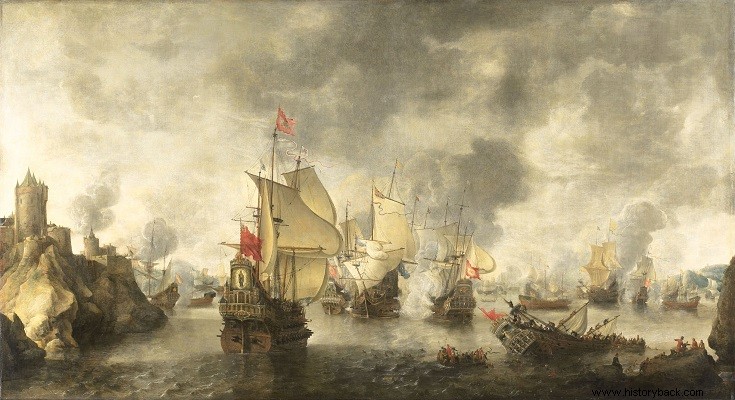
The naval battle of Phocaea took place on May 12, 1649 outside the port of the Greek city of the same name in Asia Minor, during the Cretan War (1645–1669), the war between Venice and the Ottoman Empire for the occupation of Crete.
The Venetians had managed to control the exit of the Dardanelles by establishing patrols as early as the spring of 1648. However, after months at sea most of their fleet withdrew and only 13 ships remained to control the straits under Admiral Giacomo Riva .
Riva's force was later reinforced with six more ships under Bertucci Civarano. At the beginning of May the Ottoman fleet was seen in the straits. The Turks were overwhelmingly outnumbered. They had 11 large sailing ships of war, 10 galleys and 72 galleys. The Venetian ships were all sailing ships.
At the beginning of May, the Turks left the straits. The Venetians had left two of their ships as buffers which of course could not face the Turkish fleet of about 100 ships. The Turks sailed south and reached Phocaea followed by the Venetians.
In fact many Venetian ships were chartered Dutch and English with their crews, and in order to get their masters to fight Riva promised them compensation for any damage they might suffer in the conflict.
After this "technical issue" was settled, the Venetian fleet was ready to do battle, ignoring the 5:1 numerical superiority of the Turks in ships, relying on the quality of ships and crews. And as it turned out, they were not wrong at all. It is worth noting that three ships of the Venetian fleet did not participate in the conflict.
Soon the superior technique and quality of the Christians overpowered the numbers of the Muslims. The Venetians, however, did not manage to take full advantage of their victory and give it even greater dimensions because theirs were also in danger from the explosions of the Turkish ships. So they moved away.
From the Christian fleet, no ships were sunk and the losses in dead and wounded reached only 105 men. Instead the Turks suffered a humiliating disaster. They lost 9 of their 11 sailing ships, three galleys and two galleys. Another of their sailing ships, a galley and a galley were captured. In total they lost 17 boats.
It was a memorable victory that was unfortunately under-exploited for a number of reasons. It was a success that could have saved Crete... but there are always other factors.
